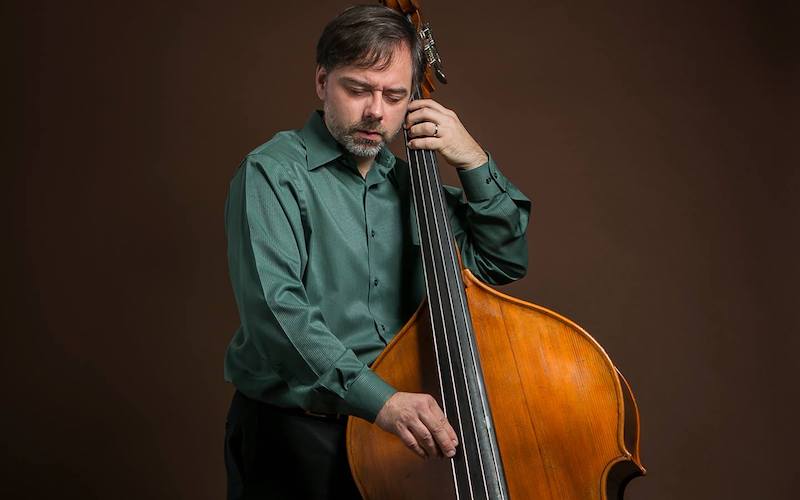Jazz interview with jazz bassist Mark Wade. An interview by email in writing.
JazzBluesNews.com: – First, let’s start out with where you grew up, and what got you interested in music.
Mark Wade: – I grew up around the upper midwest region of the United States as a kid before moving to New Jersey. I started playing music on the Electric Bass around the age of 14. A bunch of my friends were getting interested in playing music around the time and that’s what turned me on to giving it a try for myself. Once I started, I was hooked.
JBN: – How has your sound evolved over time? What have you been doing to find and develop your own sound?
MW: – I think it’s natural the people sounds develop over time just from listening and reacting to the music that’s around them. I’ve always gravitated to certain kinds of bass players who played with a certain kind of approach to develop my own sense of sound on the instrument.
JBN: – What routine practices or exercises have you developed to maintain and improve your current musical proficiency, in terms of both rhythm and harmony?
MW: – It always helps to have a musical project upcoming to focus my attention towards building my technical and musical proficiency. It can be difficult to practice solely rote exercises over and over again to maintain one’s musical vitality. That has been one of the challenges that all musicians have faced over the last few years. It’s been crucial for me to invent musical projects for me to develop and work on at home when I had no public outlets for playing.
JBN: – How do you keep stray, or random, musical influences from diverting you from what you’re doing?
MW: – I have always been devoted to learning and growing my knowledge of jazz music. That being said, I think influence and inspiration can come from anywhere, so I don’t discount any musical idea as long as it’s good, regardless of the source or genre. In that way, nothing is really a distraction.
There could be talk or advertising about your CD
JBN: – In your opinion, what’s the balance in music between intellect and soul?
MW: – That’s interesting question. As musicians we are often trying to stretch our sense of concept and in doing so we end up entering new sonic territories. When the music becomes an exercise in music theory we lose that sense of emotional connection to the music and that’s never a good thing.
JBN: – There’s a two-way relationship between audience and artist; are you okay with delivering people the emotion they long for?
MW: – I think as long as you are presenting a convincing story through your music, people will connect with that on some level. There will always be some people who do not resonate with your music, and that’s fine. People connect emotionally with music when that music comes from a genuine place within the artist.
JBN: – How can we get young people interested in jazz when most of standard tunes are half a century old?
MW: – Education is the key. The earlier that people are exposed to jazz music, the better. The vocabulary of jazz is much denser than popular music, so often it helps for people to have a guided entry into the music. Once they do, they’ve got a real chance of connecting to this great art form.
JBN: – John Coltrane once said that music was his spirit. How do you perceive the spirit and the meaning of life?
MW: – Any creative expression is an extension of the spirit within us. Expressing that spirit is one of the fundamental aspects of living.
JBN: – If you could change one single thing in the musical world and that would become reality, what would that be?
MW: – The one thing I would change would be the relevance of jazz music in the culture at large. Musicians rely on an audience base to support their creative activities. The larger the audience, the healthier that activity can be.
JBN: – Whom do you find yourself listening to these days?
MW: – I listen to a wide selection of jazz and classical music. I recently got a subscription to satellite radio, so I’m hearing some new artist as well as some old recordings that I wasn’t familiar with. That’s been a real treat.
Interview by Simon Sargsyan
P.S. – Note: You can express your consent and join our association, which will give you the opportunity to perform at our Jazz and Blues festivals in Europe and Boston, naturally receiving an appropriate royalty. We cover all expenses. The objectives of the interview are: How to introduce yourself, your activities, thoughts and intellect, and make new discoveries for our US/EU Jazz & Blues Association, which organizes festivals, concerts and meetings in Boston and various European countries, why not for you too!! You can read more about the association here. https://jazzbluesnews.com/2022/11/19/us-eu-jba/







More Stories
Interview with Janis Siegel of The Manhattan Transfer: Jazz, being a more refined, interpreted form of music
CD review: George Benson – Dreams Do Come True: When George Benson Meets Robert Farnon – 2024: Video, CD cover
The band was tight as ever. The Warren Haynes Band cuts loose: Video, Photos